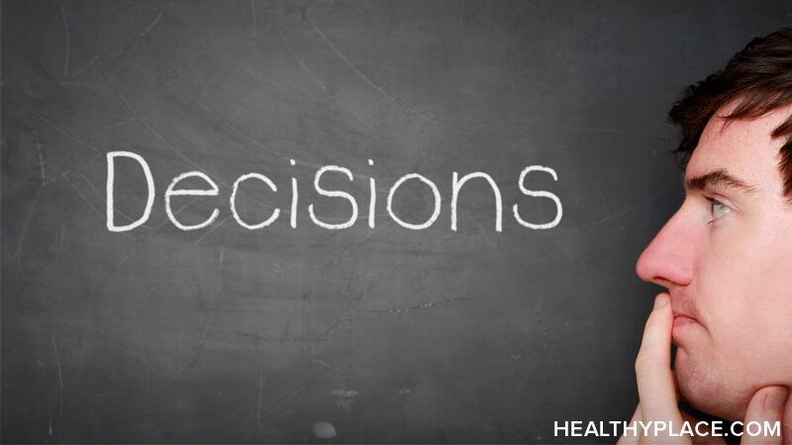Dissociative Identity Disorder Disclosure: DOs and DON'Ts

The decision to disclose your dissociative identity disorder (DID) is a deeply personal one. Many, perhaps most, people with DID live in near silence about their disorder. They may tell only their family or no one at all. Some choose to share their dissociative identity disorder diagnosis not just with family but also friends. I belong to a smaller group of people who publicly say, "I have DID." What's comfortable for you may be unhealthy for someone else, and vice versa. With that in mind, what I offer you today isn't advice on whether or not to reveal your DID diagnosis, but a short list of DOs and DON'Ts - things to keep in mind when considering disclosure.
DID Disclosure DOs:
- Consider your motive. What do you hope to achieve by revealing your diagnosis? You're more likely to get what you want if you have a clear understanding of what that is. Additionally, your listener needs to know why you're saying, "I have DID." Otherwise, they may not know how to respond.
- Think about your audience. Who are you going to tell? A friend? A love interest? Allow the listener's identity and their role in your life to help shape your delivery. The way I told my partner about my diagnosis was significantly different from how I tell casual friends now, for instance. The depth, tone, and emotional revelation in your disclosure should be appropriate to your relationship.
- Plan ahead. When and where are you going to come out? What will you say? It might help to write your own list of DOs and DON'Ts for this part alone. It's best if you and your listener are relaxed. Think about what will engender safety and comfort, and what will hinder it.
DID Disclosure DON'Ts:
- Apologize. Your disclosure isn't a confession. By sharing your dissociative identity disorder diagnosis in an apologetic or embarrassed way, you tell your listener that DID is something to be ashamed of. Be honest, but keep in mind that how you present DID to others will impact their perception of it.
- Ignore the risks. Once I disclosed my diagnosis to someone who responded, "People don't want to hear about your problems." I was crushed and humiliated. In retrospect, it was a careless choice on my part. I hadn't prepared myself for such a caustic response because it didn't occur to me I might receive one. Ask yourself, how might my listener respond? Then be realistic about the potential consequences of those reactions.
- Disclose under pressure. Some situations are beyond your control. But if possible, come out because you've weighed all the considerations and decided it's what you want to do, not because you feel pressured.
 Telling someone, anyone, "I have DID" is a big deal. If you choose to come out, take time to prepare. Think about what you might add to this list of DOs and DON'Ts for disclosing dissociative identity disorder. And remember that you have the capacity to determine what's right for you. Trust yourself.
Telling someone, anyone, "I have DID" is a big deal. If you choose to come out, take time to prepare. Think about what you might add to this list of DOs and DON'Ts for disclosing dissociative identity disorder. And remember that you have the capacity to determine what's right for you. Trust yourself.
Follow me on Twitter!
Think Photo by H. Michael Karshis
APA Reference
Gray, H.
(2010, September 6). Dissociative Identity Disorder Disclosure: DOs and DON'Ts, HealthyPlace. Retrieved
on 2025, October 23 from https://www.healthyplace.com/blogs/dissociativeliving/2010/09/i-have-did-disclosure-dos-donts
Author: Holly Gray
Hi Diana,
Thanks for reading and taking the time to comment.
I thoroughly respect your caution when it comes to disclosing your DID diagnosis. For years I kept Dissociative Identity Disorder to myself and a very few people. Even the thought of revealing my diagnosis to others terrified me. And I rarely discussed it with those very few people I did tell. In fact, I went through a period when I refused to discuss it with even my therapist most of the time. It was a weighty, lonely secret. But one I didn't feel I had the option of disclosing.
I'm not sure why I'm able to live completely out and open about my diagnosis today. I suppose there are a lot of reasons. But I haven't forgotten what it felt like to need to keep my diagnosis as private as possible. It was almost like DID was a living, breathing, and highly vulnerable thing and I was charged with its protection. It's dramatically different for me now, but I'm all too aware that my situation is rare. And I have respect for the choices of others, like yourself. Like you said, we're in this together.
"I had a friend who told everyone in our church she had MPD (many years ago) and they all told her she was 'possessed.'"
I don't think I've met anyone with Dissociative Identity Disorder who hasn't been told, at one time or another, that they were possessed. I remember the first time someone told me. It hurt me deeply and took a surprisingly long time to get over. It's interesting to think about now, because if I heard the same thing today I doubt I'd care much at all.